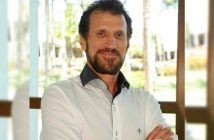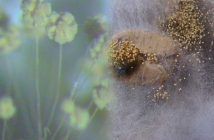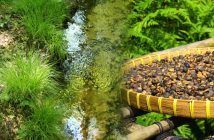Seated on Cuesta de Botucatu, Fazenda São Pedro do Pardinho, of Cuesta coffees, works to harvest biodynamic special coffees too soon.
The 400 hundred-hectare property is owned by Pinotti family for over 60 years. Having come from Italy, since the beginning they already planted coffee and raised cattle. Today, the family’s third generation represented by young entrepreneur Yuri Pinotti runs the farm whose real vocation is coffee.
Coming from São Paulo towards Pardinho municipality, leave Castelo Branco Highway at km… and turn right to João Emílio Roker Highway. At the first left curve, the visitor faces an Oasis: Cuesta Café, a coffee shop in the middle of nowhere, with a breathtaking view.
It’s the perfect excuse to relax while tasting an espresso, a cappuccino or even an affogato or a cold brew. You choose.
Beside Cuesta Café, the farm
With an altitude between 900 and 1,050 meters, the property counts on one of the largest fresh and drinking water reservoirs in the region. It has 12 fountainheads and one waterfall, surrounded by the Atlantic Forest. Due to its climate, with annual average temperatures of 19.5ºC, harvest occurs later than in other regions of the state.
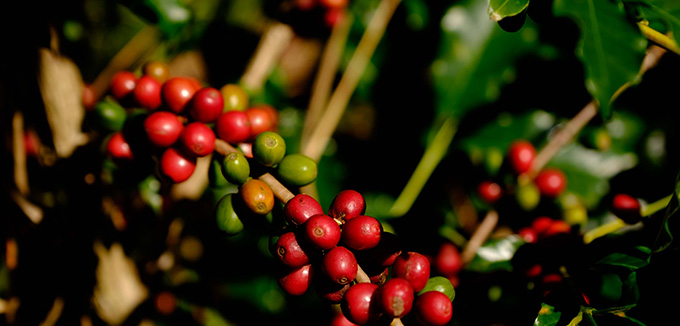
It is a 400-hectare property, 150 of which are preservation area and 100 hectares occupied with coffee plantation, 15% of which are special coffee plantations. It is considered mid size property, producing excellent quality coffees. It is semi-mechanized; during harvest the farm counts on 18 workers while in the rest of the year only 10 workers are required. The production is around 1,800 coffee bags a year.
The species planted are yellow Catuaí (larger portion) and Acaiá (mix of Bourbon and Típica), whose ripening occurs earlier. “We are also conducting some experiments with a small plantation of Laurina, which naturally contains less caffeine. For the future, we will also have ibari, a plant that yields a very good drink, however, with low productivity”, explains …
Special coffees
At São Pedro do Pardinho farm, eight bags of each micro lot are produced, natural cherry manually harvested. Hulled coffees are only produced in large scale.
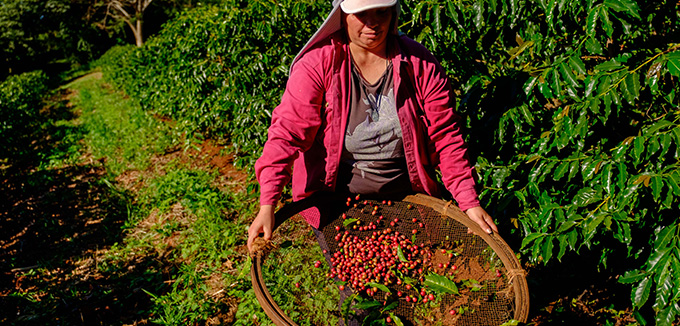
“A portion of our coffee has organic seal, while other portion has conventional seal, and is being transformed into biodynamic”, tells Yuri, with enthusiasm. And the reason is quite simple: quality and responsibility. Brazilian people consumes 5.2 kg of agrochemicals per year or five-liter gallon each, according to survey by Anvisa – National Sanitary Surveillance Agency – in 2015.
The interest in biodynamic culture emerged from the work with local farmers from the Biodynamic Association, seated close to the farm, in Botucatu.
“We are working with biodynamic plantation for two years now. The differences in biodynamic plantation start with the work on the soil: it must stay at least five years without any type of culture. Manure is not used. The soil is analyzed to verify levels of NPK (Nitrogen, Phosphorus and Potassium). If there is lack of nitrogen, we compensate it by planting forage turnip that fixes nitrogen to the soil; if there is need of phosphorus, we use sun hemp that fixes the substance, and, for Potassium we use black oats”, he tells.
And adds: “then I wait for them to grow and form brushwood. After that, we incorporate them to the soil that will rest for 15 to 20 days. Only after this period we start to plant.
And if any other correction is needed, we use a fully natural castor bean preparation. As to diseases, we use these biodynamic preparations as homeopathic medicine to the plant. We take six months to prepare them”, he explains.
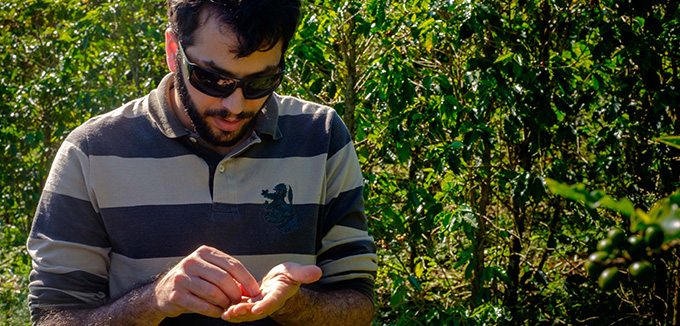
He also explains that, though still in transition process, they can notice that the special biodynamic coffee requires much more treatment outside the harvesting period.
Separation is manually made for roasting, at the farm, and machinery must be clean before being used to biodynamic grains. For the biodynamic process we must clean all machines and we can’t use the same water used in other processes”, he adds.
The goal is to have, for now, 10% of the farm special coffees as biodynamic. Our whole land is perfect for coffee. And the biodynamic coffee is too much demanded abroad. Usually, it is a more expensive product, around 30% more expensive than the organic special coffee”, he says.
In addition to biodynamic coffee, the Farm is also producing soy bean, buck wheat, oat, quinoa, second-crop corn, and three types of bean: moyashi, azuki and carioca. Since the production is still very small, they only sold it regionally.
Yuri tells that they are interested in planting olive trees in the future in a portion of the farm where the land is full of gravels to use 100% of the land, one of biodynamic culture premises.
Another characteristic of the region is the intense winds. To protect the plantation, they count on silk oaks, eucalyptus and banana trees. And olive trees can also help in this regard.
Drying methods
The farm counts on a suspended yard, dryer and conventional yard made of cement. “Many things were changed with the start of biodynamic coffee plantation, since all processes must be fully separated from the conventional coffee. For this reason, we still don’t have the hulled, not to change the process in the machine”, he explains.
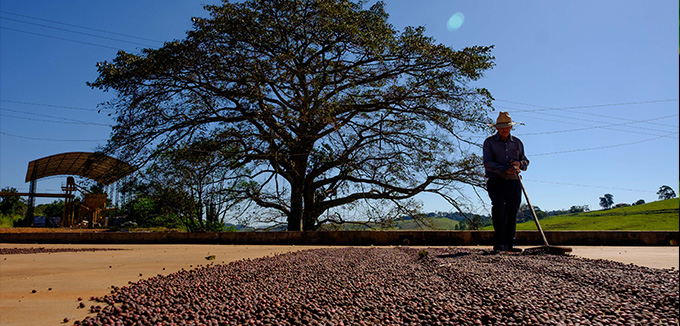
Roasting
Roasting is fully made at the farm, in an Atilla, according to each coffee profile. Micro lots are also prepared here to be later on sold at Cuesta Café and at TEM café store, located in Buenos Aires Square, Higienóplis, São Paulo.
What is biodynamics
Biodynamic agriculture is an agricultural method of production that was born in 1924, during a cycle of eight lectures given in Germany by Rudolf Steiner, creator of Anthroposophy.
Biodynamics does not use agrochemicals, poisons, herbicides, transgenic seed, antibiotics or hormones. Besides, it seeks integration and harmony among the several activities of a property, like vegetable-garden, orchard, cereal field, animal raising and native forests. It also works with cosmic cycle knowledge. Biodynamics uses homeopathic preparations made of minerals, cow manure and medicinal plants that promote vitality of foods. Farmers use the agricultural astronomic calendar as an important tool to guide to the best moments to work on the soil: planting, cultural treatments, harvesting
Demeter is the brand that globally identifies biodynamic products. Demeter products are part of an international ecologic network, linked to Demeter International, headquartered in Germany. Other countries also count on Demeter: Denmark, Egypt, Finland, France, England, Ireland, Italy, Canada, Luxembourg, New Zealand, Netherlands, Norway, Austria, Sweden, Switzerland, and USA.
The person in charge of biodynamic products in the farm, Douglas…, explains the process: “astrological calendars for harvesting are used since the beginning of agriculture, but the Germans took them to science level. The first biodynamic culture was radish.
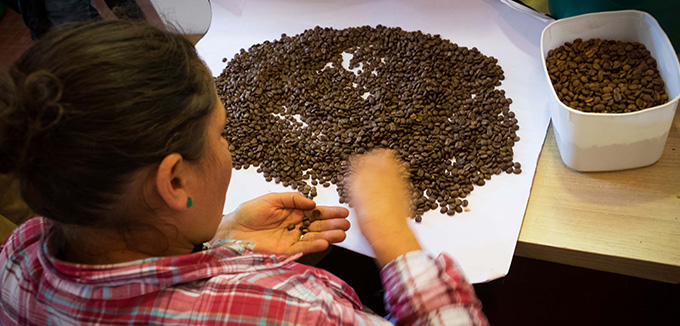
Biodynamics arrived in Brazil after the Second World War, with the coming of Germans. Biodynamics comprises many theories, like for example, Trophobiosis, which sustains that any physically and spiritually healthy human being is immune to diseases. So, a plant that counts on all nutrients, planted at the right time, and with enough space to develop, will not catch plague, nor have problems in its development.
In the past, biodynamic agriculture was used only in small properties, particularly in small vegetable-gardens. But since the 60s, this panorama started to change.
The biodynamics market in Brazil has not grown as the organic market has, but, in Europe, the demand is huge. One example of success are the biodynamic wines, with some labels considered the best worldwide.
TEM Café
The charming store is seated in front of Buenos Aires Square, in Higienópolis, São Paulo central area. It is different because, for now, it doesn’t sell the drink ready, only the grains, which can be ground on the spot.
In addition to Cuesta Cafés own brand, it sells micro lots of around 30 varieties from different regions of Brazil, since the owner is a hunter of good grains. It also promotes degustation and sells wares like cups, filters, grinders, etc.
It is expected to have a park let very soon, and then it will be enabled to offer regular services of a coffee shop. Let’s wait!
TEM CAFÉ
Rua Alagoas, 563 – Consolação
Phone.: (5511) 36613269/ temcafe.com.br

